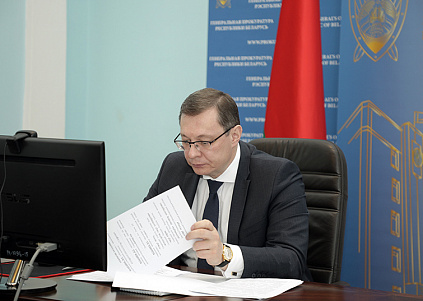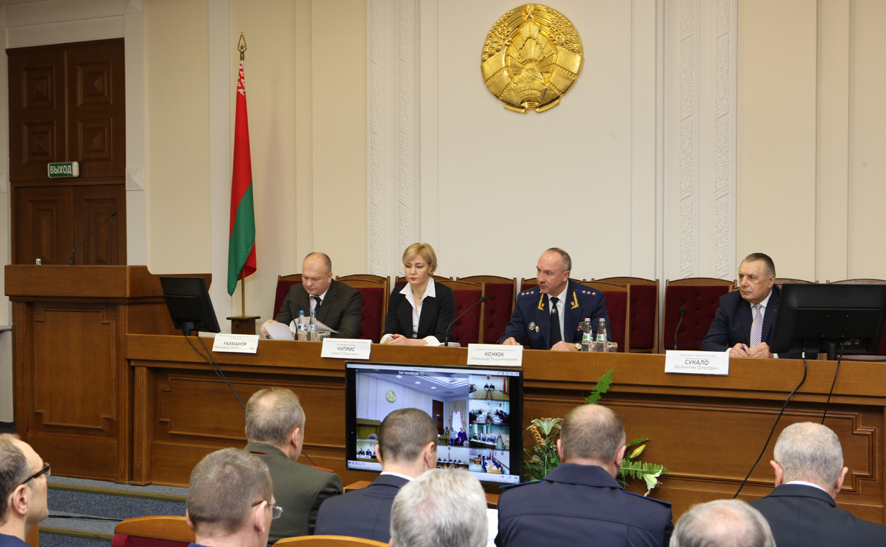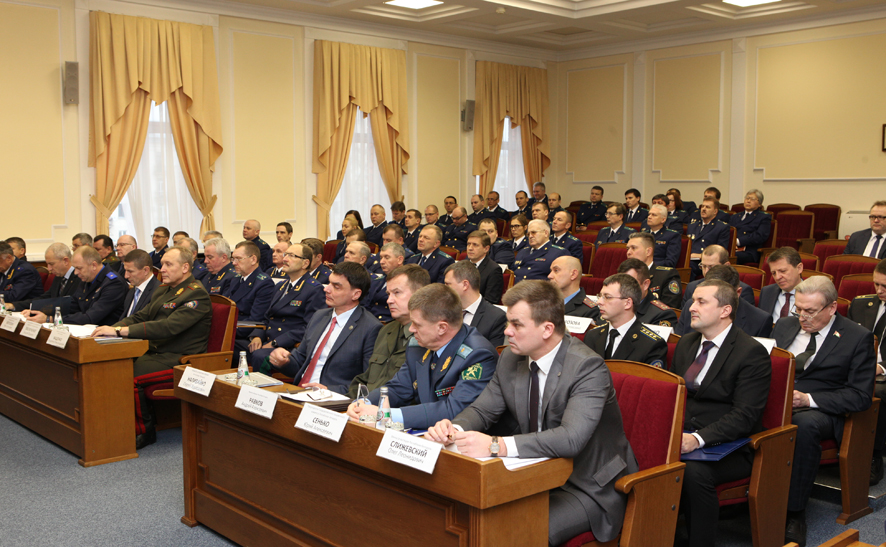The agenda included such issues as the results of legislative compliance verification of the enforcement of writs of execution and approval of the 2020-2022 Anti-Crime and Corruption Program.
The following members of the Republican Coordinative Meeting participated in the event: Aleksandr Rakhmanov, Deputy State Secretary of the Security Council of the Republic of Belarus, Ivan Noskevich, Chairman of the Investigative Committee of the Republic of Belarus, Yuri Karayev, Minister of Internal Affairs of the Republic of Belarus, Andrei Ravkov, Minister of Defense of the Republic of Belarus, Vladimir Vashchenko, Minister for Emergency Situations of the Republic of Belarus, Andrei Pavlyuchenko, Head of the Operational and Analytical Center under the aegis of the President of the Republic of Belarus, Aleksandr Lashin, Deputy Prosecutor General of the Republic of Belarus, heads of other ministries, committees and state bodies.

Olga Chupris, Deputy Head of the Administration of the President of the Republic of Belarus, and Valentin Sukalo, Chairman of the Supreme Court of the Republic of Belarus, were also invited to participate in the event.
The meeting was held with the use of video conference so as to facilitate participation of territorial Prosecutor’s Offices and local governing bodies.
Dealing with writs of execution
Alexander Koniuk addressed the meeting, saying “A unified system of compulsory enforcement authorities has been active in Belarus for more than five years. Enforcement proceedings have stopped to be controlled by the Judiciary and fell under the jurisdiction of the Ministry of Justice... It would be impossible to realize the principle of accountability, as well as to provide state protection of rights and legal interests of citizens and organizations without an effective system of enforcement of court orders and other writs of execution.”
Aleksei Stuk, Deputy Prosecutor General, delivered the main report on compliance of enforcement proceedings with the legislation.

Aleksei Stuk mentioned, “In general, existence of a unified system of compulsory enforcement authorities helps to fulfill its main tasks, but we still have much to work on.”
For example, prosecutor’s investigations revealed some cases of illegal initiation of enforcement proceedings despite the existence of evidence of debt redemption.
Sometimes compulsory enforcement authorities (hereinafter – CEA) violated the established time period of voluntary debt redemption, provided to the debtors.
Compulsory enforcement measures haven’t always been exhaustive and relevant.
During suspension, termination or completion of enforcement proceedings not all legal requirements have been met. For example, court executors undertook decisions to terminate proceedings with unsolved legal succession issues, or completed the proceedings without verification of debtors’ property status or receiving of employers’ confirmations of acceptance of writs of execution.
Aleksei Stuk noted, “Irresponsible work of the CEA allows liable citizens to continuously avoid the payment of child support or coverage of expenses, spent by the state for child upbringing. Pre-investigation checks in regard to child support debtors are mostly initiated only upon claimant’s application, but not on the initiative of court executors.”
A range of CEA drawbacks has been connected to failure to meet deadlines for consideration of procedural complaints; some individual appeals even remained outstanding. The applicants weren’t always informed about their right to appeal the undertaken decisions.
For reference. In 2018 the number of procedural complaints, submitted for consideration to the CEA, increased from 3710 to 5836 in comparison to the year of 2017. The number of appeals, that have been satisfied, remains high – around 40%.
The Deputy Prosecutor General believes that the absence of the right for the local CEA to reverse any illegal decisions, undertaken by court executors, doesn’t allow them to promptly eradicate the established violations and therefore minimize the importance of local administrative control.

While exercising control over the CEA, the prosecutors also managed to establish flaws in the work of other participants of the law enforcement: Tax and Financial Authorities, Internal Affairs Offices, Emergency Situations Offices, Executive Committee Divisions, Inspections of Natural Resources and Environmental Protection, which act in the capacity of a claimant. Among the major drawbacks are inaction, untimely submission of writs for execution, absence of control over their enforcement, passivity in appealing of illegal decisions.
Court rulings that have come into force, decisions and orders weren’t always executed on time.
At the end of his speech the Deputy Prosecutor General touched upon exclusively new criteria for efficient work of the CEA, developed in collaboration with the Ministry of Justice, as well as a set of sufficient amendments to the specific legislation, proposed by the Prosecutor General’s Office.
For example, there has been a proposal to eliminate from the list of grounds for termination of enforcement proceedings such a criterion as delivery of a writ of execution at the debtor’s place of work. Aleksei Stuk summed up, “It allows the CEA to control the enforcement of writs of execution and facilitate the process of allocation of monetary funds to the state budget.”
For reference. While exercising control, the prosecutors conducted 397 investigations, which results helped to gather 353 opinions on elimination of legislative violations, introduced 177 orders and 552 notes of protest. 277 liable individuals were subject to disciplinary sanctions, 325 individuals experienced material consequences.
Olga Chupris, Deputy Head of the Administration of the President of the Republic of Belarus, pointed out the necessity to settle down two issues within the system of the Ministry of Justice: to eliminate legislation violations by court executors, which come as the result of lack of knowledge and institutional control, and to intensify introduction of informational technologies to the CEA work.

Anti-Crime and Corruption Program
Over the last years due to effective implementation of the 2017-2019 Anti-Crime and Corruption Program there has been established a positive movement towards decrease in the total number of crimes.
As compared to the previous three-year period the number of registered crimes decreased by 14 %-from 283,857 to 250,511.
Crime rate per 10 thousand people fell down from 100 to 85 crimes.
The decrease was namely as follows:
- in the number of deaths resulting from criminal assaults - by 15 % (from 2,672 to 2,275);
- resulting from first-degree and other types of felonies - by 8.4% (from 35,509 to 32,526);
- attempted murders - by 27.7% (from 1,298 to 939);
- assaults - by 47.6% (from 798 to 418);
- robberies - by 29.9% (from 6,178 to 4, 333);
- thefts (larceny) - by 23.3% (from 118,066 to 90,499).
To a large extent these results are connected to enhanced activity of the law enforcement block.
Systemic criminological monitoring in 2019 showed quality changes in crime patterns: there was an increase in misdemeanors and offences with minor public danger, as well as in highly latent crimes – blackmail, fraud, computer-aided thefts.
Therefore, there is an imminent necessity to develop a system of social rehabilitation for convicted individuals and prevent repeated crimes.
It is still vitally important to eradicate causes and conditions that lead to criminal offences, connected to illicit drug, arms, human trafficking, illegal migration, loss of human lives, including killings resulting from traffic and labour safety violations.
The 2020-2022 Anti-Crime and Corruption Program consists of two sections.
The major chapters of the first section refer to preventive measures and elimination of criminal and administrative offences:
connected to family violence;
among or in regard to minors;
committed by previously convicted individuals;
against public safety;
connected to drugs, psychotropic substances, their precursors and analogues;
against information security.
Some items of the Program are targeted against organized crime and human trafficking.
The second section includes a set of measures against corruption.
Reporting on the agenda, Mikhail Semenikhin, Head of the Analytical Department of the Prosecutor General’s Office, underlined, “The new Program has been approved by more than 60 state authorities and other organizations and is targeted on further realization of comprehensive and relevant measures against crime and corruption.”

Gennadiy Kazakevich, Head of the Main Department of Drug Control and Anti-human Trafficking of the Criminal Police of the Ministry of Internal Affairs, also gave his report during the Coordinative Meeting.
He justified the necessity to undertake additional measures to prevent crimes against sexual integrity and sexual freedom of minors, child pornography and trafficking, especially when these crimes are committed through the Internet.
Participants of the meeting exchanged views on problematic issues of law enforcement.
At the end of the Republican Coordinative Meeting against crime and corruption the following results were formulated:
1. Establishment of measures, aimed at:
- increase in the effective recovery of funds under writs of execution;
- unification of the compulsory enforcement proceedings;
- strengthening of institutional control over court executors’ activities and enhancement of cooperation between institutions;
- elimination of enforcement proceeding violations.
2. Approval of the 2020-2022 Anti-Crime and Corruption Program.

Later in the day Aleksandr Konyuk held a press conference.
Photo: Prosecutor General’s Office, belta.by
Prosecutor General’s Information Office
Other news
Main events







